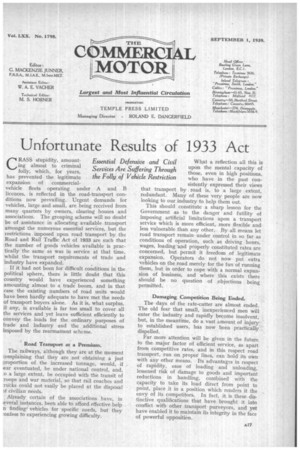Unfortunate Results of 1933 Act
Page 19

If you've noticed an error in this article please click here to report it so we can fix it.
CRASS stupidity, amounting almost to criminal folly, which, for years, has prevented the legitimate expansion of commercial vehicle fleets operating under A and B licences, is reflected in the road-transport conditions now prevailing. Urgent demands for vehicles, large and small, are being received from many quarters by owners, clearing houses and associations. The grouping scheme will no doubt be of assistance in allocating available transport amongst the numerous essential services, but the restrictions imposed upon road transport by the Road and Rail Traffic Act of 1933 are such that the number of goods vehicles available is practically the same as was in service at that time, whilst the transport requirements Of trade and industry have expanded.
If it had not been for difficult conditions in the political sphere, there is little doubt that this country would have experienced something amounting almost to a trade boom, and in that case the existing numbers of road units would have been hardly adequate to have met the needs of transport buyers alone. As it is, what surplus, if any, is available is far too small to cover all the services and yet leave sufficient efficiently to convey the loads for the ordinary purposes of trade and industry and the additional stress imposed by the rearmament scheme.
I Road Transport at a Premium.
The railways, although they are at the moment aomplaining that they are not obtaining a just proportion of the increased tonnage, would, if war eventuated, be under national control, and, .o a large extent, be occupied with the transit of ;mops and war material, so that rail coaches and :rucks could not easily be placed at the disposal )t civilian needs.
Already certain of the associations have, in ,everal instances, been able to afford effective help n finding vehicles for specific needs, but they :onfess to experiencing growing difficulty. What a reflection all this is upon the mental capacity of those, even in high positions, who have in the past consistently expressed their views that transport by . road is, to a large extent, redundant. Many of these very people are now looking to our industry to help them out.
This should constitute a sharp lesson for the Government as to the danger and futility of imposing artificial limitations upon a transport service which is more efficient, more flexible and less vulnerable than any other. By all means let road transport remain under control in so far as conditions of operation, such as driving hours, wages, loading and properly constituted rates are concerned, but permit it freedom of legitimate expansion. Operators do not now put extra vehicles on the road merely for the fun of running them, but in order to cope With a normal expansion of business, and where this exists there should be no question of objections being permitted.
Damaging Competition Being Ended.
The days of the rate-cutter are almost ended. The old fear that small, inexperienced men will enter the industry and rapidly become insolvent, but, in the meantime, do a vast amount of injury to established users, has now been practically dispelled.
Far more attention will be given in the future to the major factor of efficient service, as apart from competitive rates, and in this respect road transport, run on proper lines, can hold its own with any other means. Its advantages in respect of rapidity, ease of loading and unloading, lessened risk of damage to goods and important reductions in handling, combined with the capacity to take its load direct from point to point, place it in a position which renders it the envy of its competitors. In fact, it is these distinctive qualifications that have brought it into conflict with other transport purveyors, and yet have enabled it to maintain its integrity in the face of powerful opposition.




































































